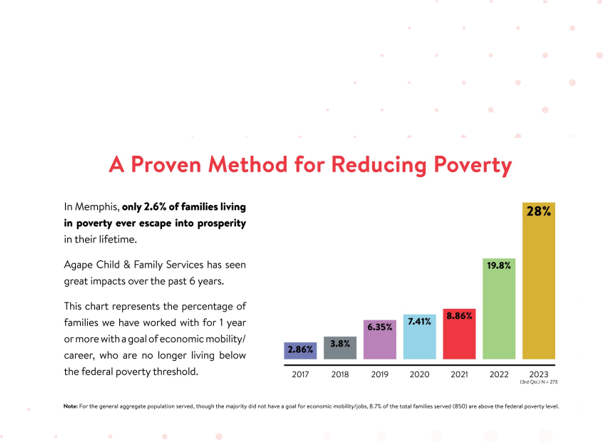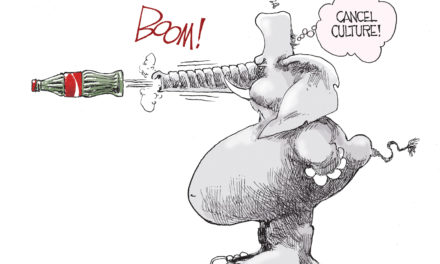Sixteen months ago, I wrote that Agape Child & Family Services was acting on the mantra that it takes a village, and in working with more than 100 organizations, it is creating numerous villages in disinvested neighborhoods to connect their residents with the resources that can transform their lives.
Its work takes a decidedly Jesus-heavy approach that may turn off some people, but Agape finds that tapping into the strong current of faith that flows through Memphis neighborhoods has been key to its success. Overall, its priorities give new meaning to the word, comprehensive, as it confronts policies and practices that support structural racism and racial inequities that are barriers to Agape’s goal of reducing poverty for served families by 10% in 10 years.
Agape emphasizes a data-driven approach so it seems a good time to check the data to see if the organization is making progress. Here’s what David Jordan, Agape’s president and CEO, provided an overview “as we holistically fight poverty for families in flourish through God.”
- Agape’s 3rd annual Faith Family Festival, presented by BluSky, was Saturday (June 29) at Shelby Farms Park.
We anticipated up to 5,000 in attendance from all churches, peoples, and ethnicities in Memphis/Shelby County and beyond….a family reunion-type event with entertainment, fun, food, friends, games…all in a family festival environment with a clear and critical purpose. We also will have for the first time 30 churches under tents from all parts of our city, all races, ethnicities….together in unity! To see a video of the event, go to: https://agapemeanslove.org/happenings/faith-family-festival/
- Spirituality & Hope: Agape serves alongside and supports capacity building in currently 6 Hub (indigenous, neighborhood) churches, providing Pathways to hope, so to be nodes of resources and support for their communities. Through this work, more than 200 people sought hope through a relationship with Jesus in the past year!
- Nearly 1/3 (28%) of families we have worked with for 1 year or more with a goal of economic mobility/career are no longer living below the federal poverty level, having served since March 2017 at least 5,000 individuals/2,500 families. See 7-year history and the continued growth of impact:
- Educationally: With 11 years of experience and engagement in schools through Agape’s poverty-fighting model…
- 95% of high school students served (via Agape’s Stars school-based program) from 5 high schools graduated this school year and 100% in the previous school year!
- 89% of nearly 900 students in 17 public schools (K-12) have attended school at acceptable levels, when having not previously, as well as 86% of these youth having appropriate behavior and 95% of their parent/guardian engaging in their youth’s school
- 100% of youth entering public school who were served in Agape’s Thrive by Five (early childhood work) were deemed Kindergarten ready!
- Relationally: 84% of couples note Becoming One, funded by U.S. Health & Human Services (HHS), has been beneficial in keeping families together and preparing singles for the longevity of marriages and the necessary skills such as financial literacy and conflict resolution.Additional information from Agape’s latest quarterly update:
OVERVIEW
Agape Child & Family Services (Agape) envisions a social and economic system that works for everyone and where no one is unfairly left behind and people, families, and communities are not dependent upon any system but live interdependent as they thrive and prosper. Our Economic Mobility and Opportunity focus teams up with local, state, and federal governments and policymakers, small and medium-sized businesses, community and advocacy organizations, funders, and researchers to help increase long-term economic security for under- and unemployed Memphians. Our target population is the 3,000-plus people ages birth to 65+ whose annual incomes are below 200% of the federal poverty level, which translates to $14,580 for an individual and $55,500 for a family of four as of 2022. Community partners work to serve and connect Memphians to life- changing opportunities and resources. As a part of a strategy for directly addressing the devastating effects of multi- generational poverty the Tennessee Department of Human Services contracted with Agape to expand and enhance its current two-generation (2Gen) strategy, Powerlines Community Network (PCN). PCN is a place-based, collective impact community transformation initiative primarily focused on serving three large communities within Memphis since March 2009.
IMPACTS THIS YEAR
PERFORMANCE OVERVIEW
Education. The education metrics measure the quality of early childhood and K-12 experiences of children in the 2Gen program. Nearly all education performance metrics are on track for the quarter. As planned, the metrics for early childhood were advanced during the first quarter via Family Connectors.
Caseload | A caseload of 827 K-12 grade students have been served through the Stars program during the 2023-2024 school year.
Early Childhood | 100% of the 141 individuals served in the first quarter with pre-school-aged children were engaged in quality early childhood experiences. This metric includes families enrolled in our Thrive by Five program this quarter. Early Childhood Connectors will continue to work with families and leverage partnerships to ensure all preschool-aged children have quality early childhood experiences.
Affordable Housing/Homeownership |
During the first quarter, of the 28 renting families from our Families in Transition program, 32% paid their rent on time, which is below the goal of 50%.
Basic Needs | Of the 73 families that have been on Family Connector caseload for at least 1 year up to the first quarter, 48% report having low anxiety on the Arizona Self-Sufficiency Matrix. These families scored as ‘can meet basic food needs, but require occasional assistance’, ‘can meet basic food needs without assistance’, and ‘can choose to purchase any food household desires,’ was less than the goal of 75% of families reporting low anxiety about the lack of food and nutrition.
Safety | Of the 73 families that have been on FamilyConnector caseload for at least 1 year up to the first quarter, 100% report feeling safe where they-live on the Arizona Self-Sufficiency Matrix. These families scored as safe, stable, or thriving in the safety domain for the quarter. This exceeded the goal of 50% of families reporting feeling safe where they live.
Trauma-Focused Service Provision | As of the first quarter, 142 individuals received ACE (Adverse Childhood Experiences) assessments and 100% of individuals requesting therapeutic services had a successful in-house referral to clinical services.
Economic Mobility | The 2Gen program’s economic metrics include parental education, training, and other professional and career development along with participation in financial literacy programming and meeting savings and credit score goals.
Adult Education | During the first quarter, 73% of adults served on caseload were actively working on goals to advance toward employment through secondary education, exceeding the goal of 25%.
Adult Education | 97% of adults were actively working on goals to promote training and life-long learning exceeding the goal of 50%.
Addressing Barriers | 55 of the 66 adults who set the goal during the first quarter to actively address barriers
to employment are making progress, exceeding the goal of 50%.
Adult Education | 97% of adults were actively working on goals to promote training and life-long learning exceeding the goal of 50%.
Addressing Barriers | 55 of the 66 adults who set the goal during the first quarter to actively address barriers
to employment are making progress, exceeding the goal of 50%.





